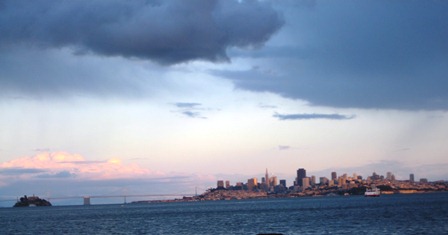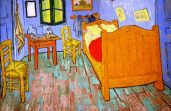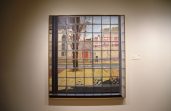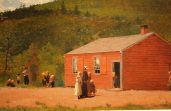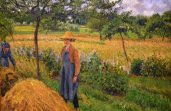Bay View
Part III
Elisabeth walked over to the wall, and looked at the painting already hanging. This time, she did not look at the bay, bridge, orSan Franciscoskyline. Instead, she focused on the people, in the painting. At first, she thought she might be imagining things, but then realized that the woman in the center of the painting was her mother, as a young woman. Elisabeth stared at her mother for several minutes, and even recognized her mother’s dress. It was a red and black, sleeveless, v-neck, dress with a wide skirt which Elisabeth remembered hanging in her mother’s closet, in a clear garment bag. Elisabeth had never seen her mother wear the dress, yet she kept it near the front of her closet where she could see it, every time she opened the closet. Elisabeth had once asked to borrow the dress, to wear to a costume party and her mother had responded with a resounding no, declining to offer an explanation. Now, Elisabeth stared at the dress, with its swirling red and black pattern, captured perfectly in oil. There was a baby in her mother’s arm, wearing a pink bonnet, which Elisabeth knew had been hers. Her mother had sent Elisabeth a box of her baby clothes, after she got married, with a note telling her that she might want to use the clothes when she had a child of her own.
Leaving the unfinished painting to rest against a chair, Elisabeth walked toward the next painting, and once again saw her mother – this time, she was a bit off centered, and the little girl was about a year old, and pointing toward a dog. She found herself and her mother in two other paintings. The last showed her at about four, riding a tricycle, with her mother pregnant, standing near her daughter.
Elisabeth wondered if she remembered being here, or if like Steve, she perhaps was thinking it all familiar because of the paintings. She turned on all of the lights, in the café, and walked back to the last painting, which was waiting to be hung. Bud had painted Elisabeth into that picture. She was wearing a white dress, which seemed very much like the one she wore on the day Jack brought her to see the restaurant, for the first time. It had to be a coincidence – artistic license, she thought. Bud had pictured her here. It was a good likeness, and the Elisabeth, in the painting, looked happy. “I am happy,” she thought as she drove a nail in to the wall and hung up Bud’s last picture.
There were more questions than answers now, and Elisabeth found herself wishing desperately she could talk to her mother. Walking up stairs, and turning off the lights, as she went, Elisabeth found herself carrying on a dialogue with the ghost in her life. How had she ended up here? Who had Bud been? What was his relationship with her mother? Why had he wanted Elisabeth to come here? It was late, and tomorrow the café would reopen. The questions were not to be answered now. She took a very hot shower and laid down to rest, hitting the play button on her VCR, as she walked by the television.
Elisabeth had finished going through the tapes which Bud had put in the pink box, and she now was watching the tapes in the library. In truth, it had all but become a habit. She barely stopped to take notice of the faces, except for Bud, who was getting younger. Tossing and turning in bed, trying to get comfortable, eureka struck – the tapes were dated! Quickly pouncing out of bed, she headed to the guest room to search for the dates which corresponded to her youth. It took several shelves of cassettes before she found her mother and herself. They had been at the café together. Elisabeth and her mother had both celebrated birthdays at the café. Her mother looked beautiful and happy. Bud repeatedly had his arms around her mother; they laughed together, sang silly songs, and toasted each other. Elisabeth hung on Bud’s leg, and rested in his lap. He twirled her around and threw her up in the air. They all looked happy.
It was almost five, in the morning, before Elisabeth finally fell asleep. George woke her up, knocking on the door, which led to the apartment, from the kitchen. It was time. The staff was ready, and in a few hours the doors to the café would once again open, to the public. The tourist were already roaming the city and peering in through the window, looking for a good to place to eat. Elisabeth dressed quickly and went down stairs where the staff soon assembled to hear from their boss. She had not prepared a speech, but nonetheless spoke.
“It is magic what happens here. We feed the hungry, shelter the weary, morn with the grieving, and most importantly we rejoice with the celebrant. I have spent countless hours watching old tapes of café events. This has been a place where both joy and sorrow has been marked, and that is what we shall continue to be with your help. Thank you for all of the hard work which you have put in, to get us ready to open today. I am grateful for your kindness and friendship, and would now like to invite you to share a meal with me and each other, before our guests arrive.”
There was applause, and then people started to slowly head toward the buffet, which had been set up in the kitchen. There was warm vibrant chatter as life filled every crevasse of the kitchen. The staff ate and drank, while Jacob video taped the brunch, just as he had when Bud had owned the café. Elisabeth settled down, into the worn arm chair, in the kitchen with a small plate of food, and marveled at how much her life had changed in a few short months.
“Bud use to sit there.” George said, coming over to Elisabeth and refilling her glass. “Not just at these little parties, which he loved to throw, but when the day had run on too long, or he was feeling blue, or had something serious to think about. Me, I would want to cool off and go into the freezer. He was something special you know. I am sure you do not know how Bud and I met. It was in San Quinton. I killed a man. Well I actually killed a lot of men, but there was one that the government took issue with, the others were all orders. I worked in the kitchen there, and met Bud, who would come and give vocational lectures about jobs in the restaurant business. He and I were both Navy men, and seemed to speak the same language. He told me when I got out he was going to make me his chef. A chef sounded so fancy. He told me I had to start thinking about food differently, that no matter what slop I was cooking inside, in my mind, I had to imagine wonderful dishes that I was going to make on the outside. I should start reading about food and planning my menus. He told me that he use to paint pictures to alter his view, and that I had to do the same thing in my mind. He would describe how he saw things, and somehow my walls would disappear. Bud had a lot of pull with the warden. I am not sure why but they too seemed to understand each other. Anyway, Bud asked the warden if I could have a painting, and keep it in my cell or in the kitchen. The warden said I could not put it in my cell, but as its’ legal owner, I could lend the prison the painting, and have it put in the kitchen. It was a silly way of going about things, but the warden liked eating at the café and wanted to make Bud happy. I was standing there, in that painting, of the bay, just like those in the restaurant. I was walking up to my new job, as the head chef, at this café. He saved my life. I looked at the painting for seven years, and it saved me. I stopped being so damn angry and started to imagine myself getting out. It was manslaughter, in case you are wondering, I was in a drunken bar fight with another sailor, a pathetic cliché, but true story. He was a good guy too and a friend, until I punched him and he fell, knocking his head on the bar. His family came from some money and wanted justice. There was no justice. The guy was dead, at my hand. Anyway, there you have it. That is the thing you know, the bad stuff happens, and there is nothing we can do about it, but you have to survive it and somehow find a way to still thrive. Bud knew that – he knew that you had to keep going, day in and day out, even when it all seemed pointless.” George stopped for a moment to finish the lemonade, in his glass. He stared at Elisabeth, looking for a reaction, and she was conscious that she should say something, but words failed her. Everything which came to her mind seemed inane and trite.
George put his glass down and began to speak again. “Did you know that Bud got thrown in jail? He was innocent, not that it matters inside. A friend, well someone who said that he was friend, asked Bud to hold a package for him. Bud knew the friend was up to no good, but you do favors for your friends. After a couple of weeks, the friend was leaving town and asked Bud to bring the package to the bus station, which Bud agreed to do, because he had to pick someone up there. On his way to the bus station, he said he was excited and not paying attention, and got into a traffic accident; the cops showed up, and he ended up being charged with felony possession, with intent to sell. With no money for a lawyer, he was railroaded. It was quite a mess for him, and pretty much cost him your mother. Eventually, the friend ended up in the system and actually came clean about what had happened to Bud; but by that time she had gotten married. That was not her idea either, that was Bud who did not want to see her alone.”
George suddenly stopped speaking, almost as if he realized he had said too much; but it was too late. He had Elisabeth’s full attention, and she was overflowing with words. “What do you mean? What happened? When did this happen? Did my mother leave Bud? She loved him? He loved her? I have seen the tapes. I don’t understand. Are you saying that Bud was . . .” She stopped herself midsentence, uncertain as to whether or not she even wanted to pose the question.
“I have said too much Elisabeth. I am sorry. I owe Bud everything, and I promised to honor his wishes.”
“What wishes?” Elisabeth asked somberly.
“His wishes about you, he never had any say over anything before, but now he does, and I owe him that. Plus that, we need to get everyone out of here and get ready to open the doors. Bud is answering all of your questions. You know that. Everyday you see more.” George walked over to the stove, cleared his throat, banged a pan, and told the group it was time to wrap up brunch and open the restaurant. There was a form of cheering, as the mood changed and there work day began.
Elisabeth said nothing, threw her plate, in the trash, with her meal uneaten, and then made her way to the front of the café. There were people lined up outside waiting the reopening of the café. It was a big weekend for the local merchants, for whom the tourist season was starting to wind down; nevertheless, Elisabeth saw more than one familiar face through the window. Her new neighbors had come to wish her well; even the competition had shown up. Right before she turned the key, to open the front door, Elisabeth called the wait staff over and announced that today’s meals would be on the house. “At the end of dinner, thank your customers for coming; and let them know that they have been served with the compliments of the house. If they tip, you are welcome to keep your tips, if not, do not worry, for I shall compensate you appropriately.” There was silence, from the staff, as they turned their heads toward Jacob, who was waiting to tape the opening of the doors. She smiled, pleased with herself, and turned the key.
“Welcome!” Elisabeth said as the patrons poured in through the doors, and quickly filled the bar and wait list. For hours the café was overflowing with guest and friends, many bringing gifts and cards to congratulate Elisabeth, on the reopening. It was a long day, teeming with hundreds of well wishers. At midnight, Elisabeth finally closed the doors. There were still several people eating, but the night was coming to an end. Sitting alone, at a table near the front, Elisabeth noticed Jack. Their eyes fond one other, at the same time, and warm smiles crossed their faces. He got up, and started to walk toward her.
“Congratulations Elisabeth, you have done a fine job.” Jack extended his hand toward her.
“Thank you, Jack. I am so pleased you were able to come tonight. I hope you have enjoyed the food.”
“I have Elisabeth. What I have eaten so far has been delicious – both familiar and yet new.”
“I have added a few things. Please, sit down, and finish your food before it gets cold.” She motioned toward the table, and he followed in her direction.
“Will you join me? I bet you have not eaten a bite all day.” He stood, at the table, waiting for her to speak.
“As a matter of fact, I am starving. I did not finish lunch.” The words dropped out of her mouth, as he reached over to pull her chair out, and they both sat down.
“May I get you something?” Jacob reached the table almost before she sat down.
“Yes Jacob, would you ask George to serve me whatever is easiest, at this hour.”
“Yes, of course.” George started to turn away, when Elisabeth called him back.
“George, would you bring us a bottle of our bestChampaignand a dish of fresh, whole strawberries, on ice. I would like that now.”
“Very good.” George said, smiling and quickly turning toward the bar.
“I hope you don’t mind.” Elisabeth said, looking at Jack. “I am feeling like celebrating; and I think perhaps a bit of chat.”
“Okay, I love a good chat. What would you like to talk about Elisabeth?” Jack said, as he wiped his mouth, and looked directly at her eyes, which were sparkling in a way he had not noticed before.
“I would like to talk about my father – you know Bud.” She locked eyes with him, and neither flinched as deep breaths were taken. He nodded, and she half smiled, slightly cocking her head, and raising her brow.
“How long have you known?” He asked, as he created a perfect bite of grilled lobster and wilted spinach.
“I am not sure. I guess I have suspected something for a bit. So, will you answer my questions, or is there something else yet for me to do?” She waited.
“No, there is nothing. I knew you would come to this moment more quickly than what Bud thought. He did not want you to learn of him without first knowing him and trying to understand the circumstances.”
“I am not angry Jack. I just want to know the truth now.” Elisabeth said nothing, as Jacob brought her a mushroom omelet, with fresh sliced tomatoes, in vinaigrette, and blanched asparagus with shaved Kasseri cheese – the perfect midnight meal, she thought. He then placed a large bowl of berries in-between Jack and Elisabeth, and opened theChampagne. She thanked him, and Jacob stepped away.
Jack picked up his glass, and raised it toward Elisabeth, who followed his lead. “To you Elisabeth, for daring to take a chance – for going down a poorly lit road, with the barest of direction, and not turning back. There are not many people who would walk away from a safe and familiar life, and head into uncertainty, on a journey of discovery without knowing the treasure they seek. I lift my glass to you, who are your father’s daughter, in every way.”
Elisabeth tipped her head in acknowledgment and gratitude and drank the glass ofChampagne, which was quickly refilled. She ate, and Jack talked.
“Bud and Jacqueline had been high school sweethearts. It was near the end of the war inVietnam, but Bud was still certain to be drafted. He had spent summers on Lake Erie, and thought a couple years at sea would be better than time in the army. Bud asked Jacqueline to marry him, and follow him out toCaliforniaor maybeHawaii, depending on where he would be posted. He figured they could start a new life together, away fromCleveland, which they both hated. Bud knew the first two years would be difficult, but he thought she could get a job, while he was at sea. They could save money, and maybe open a business and buy a house, when he got out of the Navy. Your mother said yes. She was in love with Bud and would have followed him to the ends of the earth. Unfortunately, your grandparents found out about her plans. She was a few years younger than Bud and needed her parent’s approval to get married. They disapproved, thinking Bud was only looking for a way to stay out of the army; and certain that he would ruin her life. Jacqueline was smart and pretty, and they rightly wanted her to go to college, and make something of herself. Bud signed up for the Navy, thinking his soon to be bride would be coming with him, but that just was not going to be. He was given leave, inSan Franciscobefore being shipped out toJapan. She came to see him here, telling her parents that she was going to check outMillsCollege. To hear Bud tell it, it was quite a ruse that they pulled, on your grandparents. Anyway, they spent three days in the bay area, coming toSausalito, and falling in love with this place. It was your mother who wanted the café. Bud did not care; he just wanted her happy and a way to earn a living. For two years they wrote each other, with the letters going to one of her friend’s house. I think the woman’s name was Stacy – does that sound right?” Jack did not wait for answer, but kept speaking.
“Anyway, the two years passed, and it was all set. He was discharged from the Navy, rented a little apartment in the city, and Jacqueline who was now old enough to get married, took a Greyhound bus to California. Bud was supposed to meet her, but on his way, he got into an accident, and ended up in jail. I guess George has told you that part. So that was it really. The next day or two Jacqueline figured out how to post bail, and as the news went from bad to worse, Bud realized that he might be going away for awhile, and sent your mother back to her parents. The problem, of course, was that she was pregnant with you. As you know, things weren’t like they are now. Bud asked his brother, Walter, for help. Bud wanted some money, a loan to pay for a lawyer. Walter instead offered to marry Jacqueline, to save her reputation and provide for her and you while Bud was in jail. I know, the whole thing sounds crazy. I guess Walter had always had feelings for Jacqueline. He was willing to marry her, and raise you as his own. Bud was looking at ten years in jail. Walter said that he would respect your mother’s feelings and let the marriage develop as she wanted. If she fell in love with him, they would stay married, if not, after a few years, they could be divorced and everything would be okay. There did not seem to be any sane solutions, and six weeks after she married Walter, the man whose drugs Bud was caught with, was arrested and confessed to everything, clearing Bud’s name.”
Elisabeth had stopped eating and drinking. She sat staring at Jack, hanging on every word. “What happened after that?”
“Chaos. It was almost five years of chaos. Bud bought this building with money that the drug buddy gave him; and he tried to get your mother to come out. She said she was too far along, in the pregnancy, and could not travel, though she did bring you later. Around your birthday, those first few years, Jacqueline would come here; and things would be good. But then she would go back. Walter was in medical school, and said he needed her; and she felt indebted to him for helping her out. Her father was sick, and Jacqueline was taking care of him, and feeling even more trapped, as Walter had taken over her parents expenses as well. Bud and Jacqueline had this strange life that was mostly on hold, except a couple of weeks a year. It was Walter who eventually put an end to the trips. You were getting older, and beginning to make references to Bud, who absolutely adored you. Walter said Jacqueline owed him, and it was time she dealt with their life and forgot this fling, who she said was the love of her life. You were four the last time she brought you here. She did not have it in her to walk away from Walter. She kept in touch with Bud, and updated him on you, but I don’t think she was every happy – you might know better. That was it. Bud went on to build the life they had dreamed together, but always with something missing. He took up painting when he got out of jail; as a way to relax and he said fix his vision problems. Bud said the bars had distorted how he saw the world; and that he wanted to paint it as it should be or could be. For Bud the bay view was magic. He could always spot a beaten soul sitting in his restaurant; and he would always tell them the same thing: “Go take a walk on that bay. When you come back, if you are still feeling blue, then I’ve got your tab.” You know, he says no one ever walked away without coming back to pay the tab. He of course would always say what tab, pat the guy on the back, and tell them it would be okay. Bud was always right. You know that is how we met. My mother was on her third marriage, and I had left home. I ran away as far as my cash would carry me, and ended up at this table, ordering soup and water. Bud sent me on that walk, and when I got back he had the biggest steak I had ever seen waiting for me. Somehow he just knew what you needed. We started talking, and I told him my sad sac tale, and my dreams of being a lawyer. Anyway, he offered me a job, and a place to stay upstairs, provided I went to school. He said he had once needed a good lawyer and that being unable to afford one had cost him the best woman he had ever known. I’m sorry, I digress. Well you know the rest, when your mother died, he asked me to keep tabs on you. He promised your mother that he would leave you alone, as long as Walter was around.”
“But my father – Walter, has been dead for nine months. Why didn’t Bud call me sooner? What happened to him? I do not even know what he died from?” Elisabeth was upset, and once again did not finish her meal.
“Let’s get out of here. Jacob, you can close up, right?” Jack said as he stood, and reached for Elisabeth’s arm.
“No problem Jack. I have it under control.” Jacob said, standing back, as to not make it entirely obvious that he knew what the two were speaking of.
“I don’t want to go anywhere. I just want to understand. Did he know he was sick? He made such elaborate plans – the notes, the tapes, the boxes, the menu for Tommy Chang’s – he must have known he was unwell.”
“Elisabeth, I know I have asked a lot of you, but would you please just accompany me once more.” Jack wrapped his arm around her, and ushered her out of the restaurant.
“I don’t have keys.” She said startled. “How will I get back in, if they close up? I should tell them to wait for me, or get my keys.”
“Elisabeth, it is okay. I promise you will not sleep outside tonight. I am parked around the corner.” He removed his keys, from his pocket, and walked her to his car, opening the door as she got in, still in a dazed state. They headed out of town, toward theGolden GateBridge, which was incased with fog, and into the city. There was little said, as he drove.
She now regretted theChampagne, as she tried to sort through all of the new information, which she had learned in the last twenty-four hours. There had been a poetic beauty to this journey, but the end felt tragic. She was grateful for the tapes, and the people with their stories, and the paintings, but how cruel to learn so much and yet so little. Jack made comments about the sky and the buildings and even the missing music, as he could not find a satisfactory station. Elisabeth looked at him and wished he would say something that mattered, but in truth she knew that there were no words of comfort. Her mother had lived her life with a man she did not love, just because Elisabeth had been conceived. It would have been better if I had never been, she thought, as Jack turned corners and finally pulled into an underground garage.
“Come with me.” He got out of the car, opened the door, and guided her toward an elevator. She looked at him, but he refused to look back. They stopped on the top floor, and before the door opened, he turned her toward him and with perfect ease, kissed her gently yet firmly on mouth, and then released her. “Not that it matters Elisabeth, but at some point I would like us to finish that kiss.”
Elisabeth said nothing. The elevator doors opened to a penthouse suite. There was a man standing on the other side. “Hello Elisabeth, I am your father.” It was Bud. Elisabeth recognized him immediately from the tapes. Jack had his arm around her, and escorted her off of the elevator. She still said nothing, but he continued speaking. “I am sorry for all that you have been put through Elisabeth, but there was so much I needed you to know. Now, if you would like to have me in your life, then I would very much like to try to catch up, on all that we have missed. If not, your inheritance stands, and I will let you be.”
Those were the last words she remembered hearing. Tears began streaming down her face, as she made her way toward Bud, and wrapped her arms his neck. He quickly returned her embrace, as she took a deep breath, capturing the moment and feeling like she had fallen into familiar arms, at last.
– The End –
To Read Part I http://thatisallfornow.com/?page_id=1595
and Part II http://thatisallfornow.com/?page_id=1595

